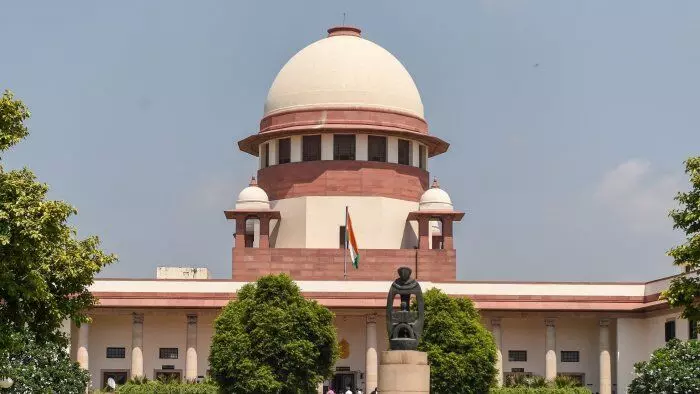
New Delhi, May 7 -- The Supreme Court scrutinised the Central government's directive to AYUSH authorities across states and Union Territories, instructing them not to act against misleading advertisements under Rule 170 of the Drugs and Cosmetics Rules, 1945. The apex court was addressing a petition by the Indian Medical Association (IMA) regarding a defamation campaign by Patanjali Ayurved and its founders against COVID-19 vaccines and allopathy.
The court examined a 2023 letter from the Central government that suspended the enforcement of Rule 170, which was established in 2018 to prevent the unapproved advertisement of Ayurvedic, Siddha, and Unani drugs. Justices Hima Kohli and Ahsanuddin Amanullah were told that multiple High Courts had challenged the rule, leading the Delhi High Court to advise a re-evaluation by the Central government.
Despite the pending reconsideration and an advisory body's suggestion to abolish the rule, the Central government urged states to avoid using it against misleading advertisements. However, the bench expressed scepticism about this rationale.
Justice Amanullah questioned the government's inaction despite the High Court's directive to decide on Rule 170, emphasising that the rule remains valid until a decision is made. Justice Kohli echoed the same sentiment, questioning the legality of suspending a current law through administrative action.
Additional Solicitor General KM Nataraj, representing the Central government, assured a prompt final decision on Rule 170.
The court also discussed the effectiveness of the current complaint redressal system for misleading ads, noting that complaints are merely passed to state authorities without follow-up, potentially leaving consumers in the dark about the outcome. The bench criticised the Advertising Standards Council of India (ASCI) for lacking enforcement power and questioned the Central Consumer Protection Authority's (CCPA) actions to ensure legal compliance in advertising. The court expressed concern over the limited actions taken by the CCPA and the need for greater consumer awareness.
The court also emphasised the accountability of celebrities and public figures in product endorsements, stating that both advertisers and endorsers share the responsibility for misleading advertisements. The court's statement on Tuesday highlighted the need for responsible advertising practices.
To combat deceptive ads, the Supreme Court has mandated a self-declaration from advertisers in accordance with the Cable Television Networks Rules of 1994 before the release of any advertisement. Rule 7 of these rules requires that advertisements comply with legal standards and respect the moral, decency, and religious sensitivities of viewers.
The bench declared: "Advertisers, advertising agencies, and endorsers are jointly liable for the dissemination of false and misleading advertisements."
The bench further noted the significant influence of celebrity endorsements on product promotion and underscored the importance of their conscientious participation in advertising. The court urged relevant ministries to establish procedures for consumers to report misleading advertisements and ensure these complaints are resolved effectively. Advertisers are instructed to upload their self-declarations to the 'Broadcast Seva' portal, managed by the Ministry of Information and Broadcasting.
For print media advertisements, the court ordered the creation of a portal where advertisers must submit their self-declarations before ad publication. Advertisers are also required to provide proof of this declaration to broadcasters or publishers. The health ministry has been directed to submit an affidavit detailing complaints received since 2018 by the Food Safety and Standards Authority of India regarding misleading food product advertisements, along with the actions taken or planned in response.
The bench reviewed guidelines from the Central Consumer Protection Authority, including those concerning advertisements aimed at children and the responsibilities of manufacturers, service providers, advertisers, and advertising agencies. State and Union Territory counsels have been asked to submit affidavits detailing actions taken against misleading advertisements that violate various acts and rules related to drugs, cosmetics, and consumer protection.
The Uttarakhand State Licensing Authority informed the court that it had suspended the manufacturing licences of 14 products from Patanjali Ayurved Ltd and Divya Pharmacy.
The bench inquired about Patanjali's efforts to retract advertisements for these products, noting that they were still accessible online. Patanjali's counsel promised a comprehensive plan by the next hearing date. The Supreme Court has scheduled the next hearing for May 14, as it continues to examine a 2022 plea by the Indian Medical Association, which accuses Patanjali and Ramdev of undermining the Covid vaccination campaign and modern medicine.
Initially, the case focused on Patanjali Ayurved's misleading ads and potential contempt charges against its promoters. However, the court expanded the scope to include broader issues such as other objectionable advertisements and unethical practices in modern medicine. The court also addressed remarks by IMA president Dr RV Asokan, who criticised the court in an interview. The court emphasised its impartiality and commitment to public interest, regardless of criticism. Senior Advocate PS Patwalia, representing the IMA, requested additional time for submissions, while Senior Advocates Vipin Sanghi and Balbir Singh, representing Patanjali and Baba Ramdev, submitted apologies for previous misleading ads. Senior Advocate Rohatgi informed the court of a filed application regarding the IMA President's comments against the Supreme Court.
Published by HT Digital Content Services with permission from Millennium Post.
